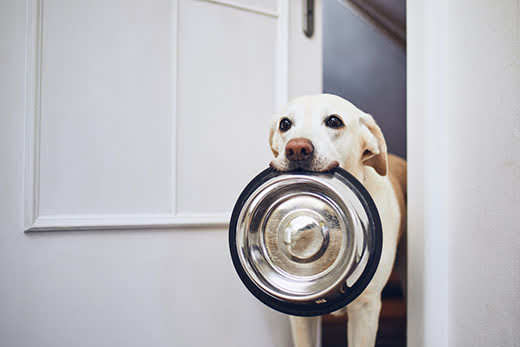
-
Find the right food for your pet
Take this quiz to see which food may be the best for your furry friend.
Find the right food for your pet
Take this quiz to see which food may be the best for your furry friend.
Featured products
 Adult Healthy Cuisine Roasted Chicken, Carrots & Spinach Stew Dog Food
Adult Healthy Cuisine Roasted Chicken, Carrots & Spinach Stew Dog FoodDelicious roasted chicken paired with tender vegetables in a succulent stew
Shop Now Adult 7+ Perfect Digestion Chicken, Whole Oats & Brown Rice Recipe Dog Food
Adult 7+ Perfect Digestion Chicken, Whole Oats & Brown Rice Recipe Dog FoodScience Diet's breakthrough nutrition supports ultimate digestive well-being & healthy microbiome for dogs age 7+
Shop Now Small & Mini Savory Stew with Chicken & Vegetables Dog Food
Small & Mini Savory Stew with Chicken & Vegetables Dog FoodA delicious complement to the nutrition of Science Diet Small & Mini 7+ dog food
Shop NowFeatured products
 Adult 7+ Senior Vitality Chicken & Vegetable Stew Cat Food
Adult 7+ Senior Vitality Chicken & Vegetable Stew Cat FoodImproves Everyday Ability to Get Up & Go
Shop Now Adult 7+ Tender Tuna Dinner Cat Food
Adult 7+ Tender Tuna Dinner Cat FoodWith delicious chunks in a decadent gravy
Shop Now Adult Savory Entrée Can Variety Pack Cat Food
Adult Savory Entrée Can Variety Pack Cat FoodPrecisely balanced nutrition with the delicious taste of savory minced chicken to help fuel the energy needs of cats during the prime of their life
Shop Now -
Dog
- Dog Tips & Articles
-
Health Category
- Weight
- Food & Environmental Sensitivities
- Urinary
- Digestive
- Joint
- Kidney
-
Life Stage
- Puppy Nutrition
- Adult Nutrition
- Senior Nutrition
Cat
- Cat Tips & Articles
-
Health Category
- Weight
- Skin & Food Sensitivities
- Urinary
- Digestive
- Kidney
-
Life Stage
- Kitten Nutrition
- Adult Nutrition
Featured articles
 Do Dogs and Cats have Belly Buttons?
Do Dogs and Cats have Belly Buttons?Learn whether cats & dogs have belly buttons like humans, what the function is, and if there are any health concerns associated with it.
Read More Does My Pet Hate Me?
Does My Pet Hate Me?Learn tips for bonding with your pet if you've ever thought, 'My dog doesn't like me, or 'Why do I have a standoffish cat?'
Read More Why Are Dogs and Cats So Cute?
Why Are Dogs and Cats So Cute?If waggy puppy dog tails and furry kitten yawns make you swoon, you're not alone. Why are cats so cute? And, dogs too! Let's find out!
Read More -


You love your dog, and it's important to you to feed them a healthy diet to keep them active, energetic and happy for years to come. Some ingredients, though, certainly might make you wonder if they are safe for your pup. There's a good chance that soy is one of those ingredients... can dogs eat soy? Are products like soy sauce safe for your dog? Some people think of it as a healthy addition to a diet while others say to avoid it. Let's explore whether soy is a healthy ingredient in dog food and if it can be eaten in various forms.
Can Dogs Eat Soy?
For the most part, yes, dogs can consume soy as long as they don't have a diagnosed soy allergy. However, it matters how much soy your dog is ingesting.
Always consult your veterinarian before feeding anything new to your dog. If you're introducing it to your pet's diet and don't know how they'll react, start slow. Only introduce one new type of food at a time so you can identify if there are any reactions to the new food. Also, if you do notice any type of reaction, contact your veterinarian right away to determine if your pet is having an allergic reaction.

Are Soy Ingredients Okay in Dog Food?
Currently, studies say yes. In an article for Your Dog from Tufts University Cummings School of Veterinary Medicine, Tufts veterinary nutritionist Cailin Heinze, VMD, DACVM, says, "Some people think soy is being used in diets as a cheap, inferior replacement for meat, but that's not the case. It's not inferior. Soy is the best quality of the plant proteins [...] While some animal proteins are more digestible and usable by dogs, other animal proteins aren't as good as soy. So having soy protein in a diet doesn't mean the protein quality is bad, and having meat or other animal protein in a diet doesn't mean that the protein quality is good."
In fact, soy has many benefits — it's high in vitamins, folic acid and amino acids. It also contains a good concentration of fatty acids, and it's a good source of fiber and potassium.


Tasty Tips
So, What's the Problem with Soy (& Soy Products)?
Feeding your dog too much of some of the most common soy options may not be the healthiest choice. Not sure what food has soy in it? Tofu, edamame, miso, tempeh and tamari are some of the most common soy foods. And don't forget soy-based products, such as soy milk, soy cheese, soy yogurt and more.
Sometimes soy is just one of many ingredients in a food. You'll often find soy in baked goods, cereals, peanut butter, vegetable oil, high-protein energy bars to name a few.
As mentioned before, soy has some inherently great benefits for your dog, but when mixed in with other ingredients in some common foods it can create problems for your dog.
Take soy sauce as an example. Can dogs eat soy sauce? The answer is no, but not because of the soy content. Soy sauce is loaded with sodium, and ingesting too much sodium could make your pet quite ill. If you ever find that your dog has licked up some soy sauce, make sure your pet drinks plenty of water.
Overall, it's best to limit your dog's food intake to healthy dog food and dog treats so you don't have to worry about your pet ingesting something unhealthy, or too much of something that is allowed. But if you've ever had concern on whether or not soy as an ingredient in your dog's food is bad for them, you can rest easy. A properly balanced meal containing soy can be ripe with benefits. When in doubt, your vet can help plan your dog's dietary options.


Erin Ollila believes in the power of words and how a message can inform—and even transform—its intended audience. Her writing can be found all over the internet and in print, and includes interviews, ghostwriting, blog posts, and creative nonfiction. Erin is a geek for SEO and all things social media. She graduated from Fairfield University with an M.F.A. in Creative Writing. Reach out to her on Twitter @ReinventingErin or learn more about her at http://erinollila.com.
Related products

A delicious complement to the nutrition of Science Diet Small & Mini 7+ dog food

Science Diet's breakthrough nutrition supports ultimate digestive well-being & healthy microbiome for dogs age 7+

Delicious roasted chicken paired with tender vegetables in a succulent stew

Delicious braised beef paired with tender vegetables in a succulent stew
Related articles

Large and giant breed puppies have different nutritional needs than other dogs. Learn how to provide the special care they need to grow up big and strong.

Hill's Science Diet Small & Toy Breed dog foods are designed to meet the nutritional needs for your small dog at every life stage. Learn more here.

Learn about choosing the right food for your mature or older dog, ensuring he receives the correct balance of nutrition.

Your dog's coat and skin are a big part of your dog's overall health. Ensure you keep your dog's coat healthy, by following these simple tips.

Put your dog on a diet without them knowing
Our low calorie formula helps you control your dog's weight. It's packed with high-quality protein for building lean muscles, and made with purposeful ingredients for a flavorful, nutritious meal. Clinically proven antioxidants, Vitamin C+E, help promote a healthy immune system.
Put your dog on a diet without them knowing
Our low calorie formula helps you control your dog's weight. It's packed with high-quality protein for building lean muscles, and made with purposeful ingredients for a flavorful, nutritious meal. Clinically proven antioxidants, Vitamin C+E, help promote a healthy immune system.

